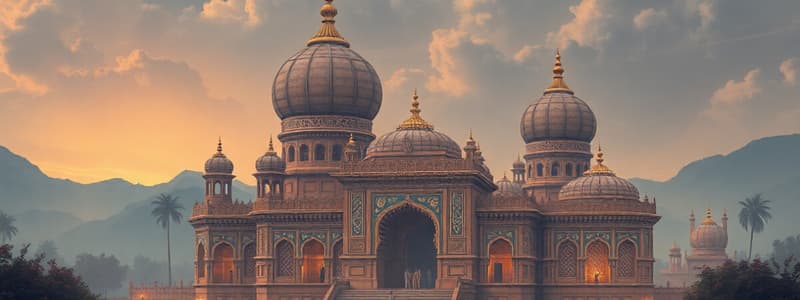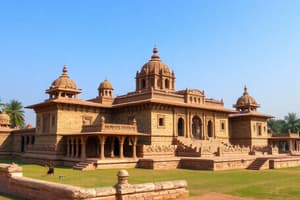Podcast
Questions and Answers
भारतीय संस्कृति में विभिन्न पहलुओं का अध्ययन करना महत्वपूर्ण है।
भारतीय संस्कृति में विभिन्न पहलुओं का अध्ययन करना महत्वपूर्ण है।
True (A)
आचार्य चाणक्य एक प्रसिद्ध क्रांतिकारी थे।
आचार्य चाणक्य एक प्रसिद्ध क्रांतिकारी थे।
False (B)
समय के साथ महत्वपूर्ण घटनाएँ और काल पर मास्टरिंग महत्वपूर्ण है।
समय के साथ महत्वपूर्ण घटनाएँ और काल पर मास्टरिंग महत्वपूर्ण है।
True (A)
हिंदू धर्म, बौद्ध धर्म और जैन धर्म भारत के प्रमुख धार्मिक परंपराएँ हैं।
हिंदू धर्म, बौद्ध धर्म और जैन धर्म भारत के प्रमुख धार्मिक परंपराएँ हैं।
Signup and view all the answers
प्लासी की लड़ाई स्वतंत्रता संग्राम का एक महत्वपूर्ण हिस्सा नहीं थी।
प्लासी की लड़ाई स्वतंत्रता संग्राम का एक महत्वपूर्ण हिस्सा नहीं थी।
Signup and view all the answers
इतिहास शब्द का शाब्दिक अर्थ 'इतिहास' है।
इतिहास शब्द का शाब्दिक अर्थ 'इतिहास' है।
Signup and view all the answers
महान सम्राट अशोक का शासन मौर्य साम्राज्य के दौरान था।
महान सम्राट अशोक का शासन मौर्य साम्राज्य के दौरान था।
Signup and view all the answers
उत्कृष्ट कलात्मक और सांस्कृतिक विकास बौद्ध धर्म की प्रभाव में नहीं था।
उत्कृष्ट कलात्मक और सांस्कृतिक विकास बौद्ध धर्म की प्रभाव में नहीं था।
Signup and view all the answers
औपनिवेशिक भारत में यूरोपीय शक्तियों का आगमन भारतीय समाज पर गहरा प्रभाव डालता था।
औपनिवेशिक भारत में यूरोपीय शक्तियों का आगमन भारतीय समाज पर गहरा प्रभाव डालता था।
Signup and view all the answers
मध्यकालीन भारत में प्रमुख क्षेत्रीय शक्तियों का उदय हुआ।
मध्यकालीन भारत में प्रमुख क्षेत्रीय शक्तियों का उदय हुआ।
Signup and view all the answers
Study Notes
Introduction to Itihas
- Itihas is a Sanskrit word that literally translates to "history."
- In the context of Indian education, it typically refers to the study of Indian history.
- This encompasses a vast period, ranging from ancient times to the present.
- Examining different eras, including the Vedic, Mauryan, Mughal, and colonial periods.
Key Periods in Itihas (Class 11)
- Ancient India (Pre-Mauryan): Focuses on the Indus Valley Civilization, Vedic Period (with emphasis on the Rigveda, Samaveda, Yajurveda, and Atharvaveda), and the subsequent kingdoms. Analysis of early social structures, religious beliefs, and political systems.
- Mauryan Empire: Highlights the reign of Ashoka, his empire's vastness, and his impact on governance and philosophy (e.g., Buddhism). Also explores the administrative and economic policies of the empire.
- Post-Mauryan India: Discusses the rise and fall of various regional kingdoms and empires, such as the Gupta Empire, and the continuing influence of Buddhism and Hinduism as well as other religions. Exploring artistic and cultural developments throughout this period.
- Medieval India: This era covers the invasions and conquests of various groups such as the Turks and Afghans before the Mughal Empire, followed by the establishment and expanding of the Mughal Empire. The key characteristics of the Medieval period include significant social, economic, and religious changes. The emergence and growth of major regional powers and kingdoms is also often covered.
- Colonial India: Examines the arrival of European powers and the eventual establishment of British colonial rule in India. Explores the political, economic, and social impact of colonization on Indian society.
- Modern India: Includes the emergence of the Indian independence movement. Focuses on important events, leaders, and political developments leading up to and including independence. Includes the partition and the first few decades as a nation-state.
Important Themes in Itihas
- Social Structures and Systems: Examination of caste systems, family structures, gender roles, and societal hierarchies across various periods.
- Economic Systems: Studying the different economic activities (agriculture, trade, crafts) and their evolution. Analyzing trade routes and economic interactions between different regions and cultures.
- Religious and Cultural Traditions: Exploring prominent religions (Hinduism, Buddhism, Jainism, Islam, Sikhism), their philosophy, art, literature, and their influence on Indian society. Specific emphasis on the development of major religious doctrines and philosophies during each phase of history.
- Political Systems and Governance: Tracing the development of political systems, administrative structures, and the role of rulers and empires in shaping India's past.
Key Figures and Events
- Identifying prominent rulers, philosophers, and revolutionaries in different historical periods, including Ashoka, Akbar, Shivaji, Tipu Sultan, Mahatma Gandhi, etc.
- Examining significant events like the Battle of Plassey, the Sepoy Mutiny, the Indian Independence movement, and the Partition.
Study Strategies for Itihas
- Chronological Understanding: Mastering the timeline of key events and periods is vital for comprehending connections and cause-and-effect relationships.
- Connecting Themes: Looking for patterns and correlations across various aspects of history (social, economic, political, religious).
- Detailed Note-Taking: Thorough notes are essential for remembering important information, figures, dates, and details.
- Critical Analysis: Developing critical thinking skills is important in evaluating historical accounts and considering different perspectives and interpretations.
- Reviewing and Retaining Information: Regularly reviewing notes, making summaries, and engaging in practice questions are vital for mastering the concepts.
Important Considerations
- Itihas, unlike many other subjects, often combines the study of history with analyzing multiple facets of Indian culture.
- Understanding the interconnectedness of various aspects of Indian life and culture is important for appreciating its historical evolution and development.
- It is crucial to consider the diverse perspectives and interpretations available for historical events.
Studying That Suits You
Use AI to generate personalized quizzes and flashcards to suit your learning preferences.
Description
इस क्विज़ में कक्षा 11 के इतिहास के महत्वपूर्ण अवधियों की चर्चा की गई है। प्राचीन भारत से लेकर मौर्य साम्राज्य और उसके बाद की गतिविधियों पर ध्यान केंद्रित किया गया है। विद्यार्थियों को भारतीय इतिहास का गहराई से ज्ञान प्राप्त होगा।




